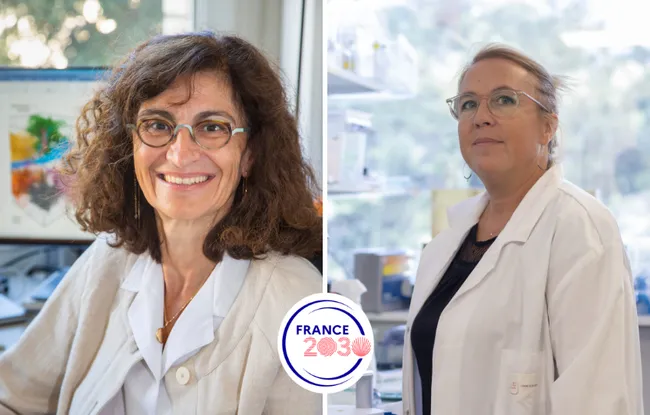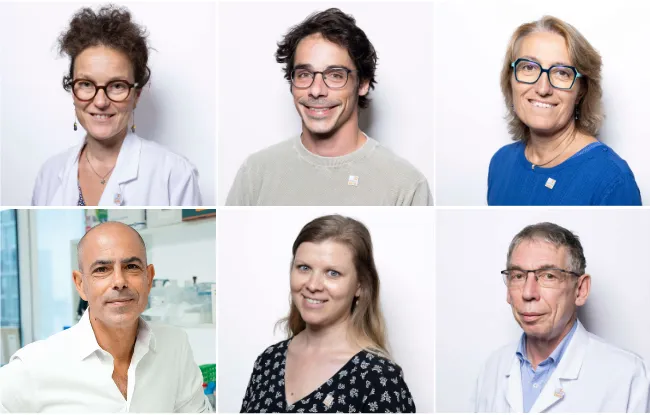- Home >
- Institut Curie News >
- Two ambitious research projects at Institut Curie among the latest exploratory PEPRs awarded
Exploratory Priority research programs and equipment (PEPR) aim to support an emerging transformation, whether technological, economic, societal, health-related or environmental, and to help explore its potential. They are selected by a call for programs under the France 2030 investment plan launched by the French National Research Agency (ANR), evaluated by an international jury and validated by the French government. One project, in which Institut Curie plays a major role, has just been selected: Cell-ID, for cellular interception medicine. The institute will also lead a working group in a second PEPR, MED-OOC, for the development of a new generation of tumor-on-a-chip.
The participation of Institut Curie in these two exploratory PEPRs illustrates the high-level research expertise of our teams. The Cell-ID project in particular will be financed over a 6-year period, to a total of 50 million euros, with strong institutional backing - that of Institut Curie and, of course, that of the pilot organizations, in this case CNRS and Inserm, and partner organizations1 including several universities, including Université PSL, which have committed to providing their support resources. It will be coordinated by Dr. Geneviève Almouzni, head of the Chromatin Dynamics research team at Institut Curie. We are proud to contribute in this way to major scientific advances in France and their international impact.
Emphasizes Prof. Alain Puisieux, Director of the Research Center.
(1) Institut Curie, Institut Pasteur, CEA, universités Paris Sciences & Lettres, Montpellier, Toulouse 3, Paris Cité and Strasbourg
Cell-ID: towards a cellular medicine of interception
Our Cell-ID project, co-sponsored by CNRS and Inserm, with seven partners1, including Institut Curie at the forefront, aims to explore how cells select destinies during the development of an organism, and how these destiny choices become aberrant under pathological conditions.
To form an individual, it takes around 35 billion cells, or over a thousand different cellular identities, produced from one cell at fertilization. The PEPR teams are seeking to understand how cells follow multiple fates in space and time to build the body's tissues, but also how potential deviations in their trajectories are at the origin of pathologies, in particular pediatric cancers. This specific project focuses on neural development, i.e. the development of the nervous system from conception to adolescence.
If we can identify the aberrations at the root of certain pediatric cancers, we'll be able to detect them before the pathological effects manifest themselves. This is what we call cellular interception medicine.
Cell-ID intends to deploy innovative technologies to understand when, how and why a cell deviates from its destiny. The consortium will use single-cell omics2 approaches, coupled with imaging, to track molecular parameters at the level of transcriptomes, chromatin organization, proteins, etc. They will also call on data analysis and artificial intelligence to build predictive models of cell fates. Finally, they will work on developing experimental models (such as mini-brain organoids) to test their hypotheses.
Institut Curie plays a key role in these technologies, with its Custom Single Cell Omics platform (CurieCoreTech), its imaging skills and its expertise in pediatric cancers. Its teams of researchers and physician-researchers are therefore heavily involved in the Cell-ID program.
It's a very ambitious project, states Geneviève Almouzni. It involves a high-level scientific community, with a dynamic that enables new teams to be integrated as progress is made, and young researchers to be trained. Our open approach will involve patient associations in our reflections, and we will communicate with the general public to share our progress. Cell-ID puts us at the forefront of research and provides us with a springboard for international collaboration.
States Geneviève Almouzni.
(2) Genomics (DNA), transcriptomics (RNA), proteomics (proteins)
MED-OOC: towards a new generation of organs and organoids-on-a-chip
And that's not all, since Institut Curie is actively contributing to another PEPR, MED-OOC3, supported by CNRS, Inserm and CEA, with PSL also a project partner. The aim? To develop a generation of organs and organoids-on-a-chip (O&OoC), which are key to meeting future healthcare challenges. These are miniaturized devices capable of reproducing in vitro various characteristics of living organs in physiological or pathological conditions.
Within MED-OOC, Institut Curie is involved in Workpackage 1. Based on multidisciplinary and translational research approaches (combining fundamental and clinical research), this aims to develop technologies that will enable these new in vitro models to integrate a range of functionalities (vascularization, immune responses, coupling between organs, etc.) to best represent the reality of pathological conditions. Four priority projects are targeted, including one coordinated by Institut Curie.
We're focusing on the design of tumors-on-a-chip, which should enable us to study the tumor microenvironment more precisely and improve treatment of cancer patients. This will provide us with new in vitro models derived from patient samples, in this case from breast cancer patients treated at the institute. This will enable us to test the efficacy of anti-cancer treatments in a personalized way. This work involves several teams from both Institut Curie and the Hospital Group. The fact that this research is being led by Institut Curie, the world's leading breast cancer treatment center, is obviously an asset
Explains Dr. Stéphanie Descroix, head of the Macromolecules and Microsystems in Biology and Medicine research team (CNRS UMR168 / Sorbonne Université) at Institut Curie.
3 Coordinated by Dr. Xavier Gidrol, Inserm research director at CEA-Grenoble, Anne-Marie Gué (CNRS) and Jean Rosenbaum (Inserm)
Implicated teams and technological platforms at Institut Curie
► Cell-ID
- Chromatin Dynamics team (CNRS UMR3664 / Sorbonne Université), led by Dr. Geneviève Almouzni
- Cell Biology of Mammalian Neurogenesis team (CNRS UMR144 / Sorbonne Université) led by Dr Alexandre Baffet
- Computational Systems Biology of Cancer team (Inserm U900 / Mines ParisTech), led by Dr. Emmanuel Barillot
- Bioinformatics (CUBIC) platform (CurieCoreTech), co-led by Dr. Emmanuel Barillot and Dr. Philippe Hupé
- Translational Research in Pediatric Oncology (RTOP) team (Inserm U830 / Translational Research Department), led by Dr. Franck Bourdeaut and Dr. Gudrun Schleiermacher
- Genome Functions in Space and Time team (CNRS UMR3664, UMR168 / Sorbonne Université), led by Dr. Antoine Coulon
- Mass Spectrometry Proteomics platform (CurieCoreTech), led by Dr. Damarys Loew
- Mechanisms of Repression by Polycomb Group Proteins team (CNRS UMR3215 / Inserm U934 / Sorbonne Université), led by Dr. Raphaël Margueron
- Genetic screening (CRISPR’IT) platform (CurieCoreTech), led by Dr. Raphaël Margueron
- Dynamics of Epigenetic Plasticity in Cancer team (CNRS UMR3244 / Translational research department / Sorbonne Université), led by Dr. Céline Vallot
- Custom Single Cell Omics platform (CurieCoreTech), led by Dr. Céline Vallot and Dr. Leïla Périé
- Statistical Machine Learning and Modelling of Biological Systems team (Inserm U900 / Mines ParisTech), led by Dr. Thomas Walter
► MED-OOC
- Macromolecules and Microsystems in Biology and Medicine (MMBM) team (CNRS UMR168 / Sorbonne Université), led by Dr. Stéphanie Descroix
- Stress and cancer team (Inserm U830), led by Dr. Fatima Mechta-Grigoriou
- Department of Medical Oncology, with Prof. François-Clément Bidard and Dr. Luc Cabel
- Dynamic Control of Signaling and Gene Expression team (CNRS UMR168 / Sorbonne Université), led by Dr. Pascal Hersen
- RNA Dynamics and Biomolecular Systems team (CNRS UMR168 / Sorbonne Université), led by Dr. Hervé Isambert
- Cell Migration and Invasion team (CNRS UMR144 / Sorbonne Université), led by Dr. Danijela Matic Vignjevic



